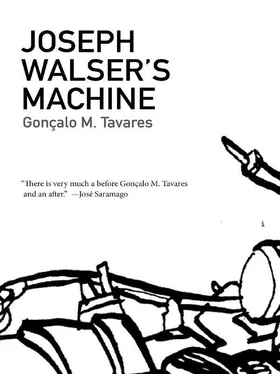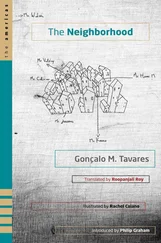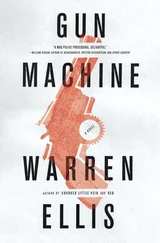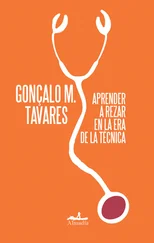Of course, Walser’s sadness too wasn’t the same sensation as is referred to under ordinary circumstances, when we employ that word: shedding a tear in this situation would have been absurd. Walser’s sadness was — we are obliged to repeat — logical and rational; it was something that we might describe as: melancholy filtered through the sensibility of competence. Walser had the lingering sensation that he’d been expelled from an entire world, the world of machines, and that his presence would no longer be tolerated. Having lost a finger, he had also lost the abilities that commanded respect in this other universe.
Like a member of a completely different species, Walser did something on that day that he never dared to do again: when the machine was resting, with its motor turned off, he walked over to it and, with his right hand, the hand that was now deformed and reduced in size, he touched the side of the machine, touched its metal lightly, and as he touched it he felt, strangely, something like the reconstitution of the finger that had been amputated — and he smiled.
“It’s still hot,” he said.
The five men were seated around the table, and Fluzst had just rolled. It was Joseph Walser’s turn.
Walser again grabbed the dice. He started to shake them in his hand.
“You look ridiculous rolling the dice with your left hand.”
Joseph Walser raised his eyes to his colleague. Stumm was one of the new additions to the group, which had continued to meet at Fluzst’s house. He had started working at the factory less than a year ago.
“It’s no surprise that your wife’s sleeping with another man,” said Stumm, something nobody expected to hear.
The room became silent. Joseph Walser stared at his colleague for a few moments, while all the other men kept quiet. However, he then lowered his eyes and switched the dice over to his right hand.
“There you go!” said Fluzst.
Normaas, one of the other players, muttered, “Let’s just play. We came here to play.”
Normaas was the peacemaker of the group. He smoked constantly.
“You can’t take this stuff too seriously. We’re all just here to make some money,” he said, letting loose a short chuckle.
The atmosphere in the room improved after this intervention. The men waited for Walser to roll.
His right hand was shaking, everyone was looking at him; and, obscenely, Stumm wouldn’t take his eyes off of Walser’s fingers.
“That hand of yours will bring you luck yet,” he said.
Fluzst brusquely told Stumm to shut up.
“Let’s play,” said Fluzst, “we’re all tired of waiting. Walser, please roll the dice.”
All interruptions were prohibited. Nobody, not a single person on the entire continent had permission to rest; there was no place to hide from existence; a true, restful break has yet to be invented.
Three months had passed since the day Joseph Walser had his accident; the same day as the bombing. Having overcome their obstacles, these two lives — Walser’s and the city’s — had returned to their usual routines, so much so that what had happened to them no longer seemed important. Joseph Walser merely missed “his” machine. It was the absence of daily contact with its mechanisms that reminded him of the fact that he’d undergone an amputation. It was as though these two losses were two equivalent substances: the absence of his machine was the absence of his finger.
The Saturday night dice games continued, and it could be said, objectively, that Joseph Walser’s luck changed for the better after his accident. He wasn’t, however, winning big pots: he’d return home each Saturday night with a little more money than he’d had when he left, but the quantities were paltry; there was no noticeable change in the family budget. Along these lines, however, the following should be noted: two months after his accident, the people at the factory had taken away the hazard pay that he used to receive for working with the machine. Since he was now doing clerical work, it would be ridiculous to keep giving him “hazard pay.” “Writing isn’t hazardous,” someone had said. Thus, objectively, even after receiving compensation for his accident, Walser made less money now. And his slight change of luck in the dice game didn’t make up the difference.
With the dice in his right hand, Walser held his breath. Nothing substantial was at stake in these movements, but this only became obvious after the dice were rolled and their effects became visible; effects that were significant at that moment, to be sure, but not very relevant over a longer span of time: they were insignificant from the vantage point of a week of Walser’s life, and almost nonexistent when one considered an entire year. Nonetheless, at the moment before the dice were released back into the exterior world, when they were still in Walser’s hand, at the moment when everything was still possible — within the limits, of course, of the dots that were inscribed on each side — at that moment, at that very second, each roll of the dice seemed as if it were able to attain a decisive density in Walser’s existence. An instant before the dice left his hand, there was the feeling that “everything can change.” But the dice flew from his hand and nothing changed concretely, and after the momentary jubilation or disappointment relative to whatever sides of the dice were facing upward, “nothing’s changed” was what Walser’s thoughts would have read, if they had suddenly become visible.
Yet, although it wasn’t very significant, the change in luck that had taken place over the last little while was a source of comfort for Walser. Winning, even trifling quantities, was important: a feeling of pride — moderate, to be sure — came over him every time he gathered his winnings from the middle of the table, with his two hands: his left hand whole, compact, strong; his right hand deformed, missing its index finger, instinctively closed in upon itself, as if to protect itself from the stares of the other players — both hands, parallel to each other, pulling the money toward him from the middle of the table with a greediness that was made grotesque by the conspicuous absence of his index finger.
During the first few moments when Joseph, having been challenged by Stumm, was forced to shake the dice in his right hand, the sensation was profoundly unpleasant. The movements that he had performed with five fingers countless times before, those slight movements that had made the dice rattle in his hand, were now limited, and Joseph felt — at the precise moment when the dice rolled toward the place that his index finger used to occupy and thus couldn’t complete their journey, instead having to draw back toward the palm of the hand, rolling straight from the thumb to the middle finger and then from the middle finger to the pinky — at that moment, Walser felt that someone, or something, had not only stolen a part of his body, but his movements as well. And this realization completely changed Walser’s understanding of his accident: more than just a material and objective part of him — which is how Walser viewed his finger, and how he had always viewed his body parts — he had been robbed of possibilities of movement; in a word: desires. He now had intentions that he could no longer carry out.
More important than the amputation of an organic, concrete body part was the feeling that he had been defrauded of something that had been housed in his brain, yes, precisely that: something in that intimate, hidden organ, that most personal of human organs. Something of great importance had taken place in the less visible parts of his body: external reality had interfered with that which he had assumed was most protected, and which he most considered his; thus: “the furthest removed from the day-to-day.” The things in his body that he had always considered “the furthest removed from the day-to-day,” to take up this felicitous expression, were, without a doubt, his thoughts, his inner life — made up of his mental images, his plans, his intentions. The external world had tampered with the part of his body that he had always considered invisible, and thus untouchable.
Читать дальше












